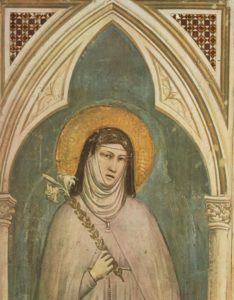Today we dangle the FINAL spot in the Saintly Sixteen in front of two worthy saints, Clare of Assisi and Isidore or Seville. But that's not all that's at stake here. You see, Clare is the patron saint of television while Isidore is the patron saint of the internet. So, when the votes are counted, we'll be able to declare, once and for all, whether TV or the internet is the greatest time waster of them all. (No word yet on whether a patron saint of Netflix has been declared).
Yesterday Elizabeth the New Martyr defeated Gregory of Nazianzus 58% to 42% to advance to the next round where she'll face Hildegard of Bingen. Yes, folks, that means that three, count 'em, three Elizabeths will advance to the Saintly Sixteen.
So read, vote, and then get back to mindlessly either watching TV or scrolling through Facebook.
Clare of Assisi
 Saint Clare of Assisi often is overshadowed by her contemporary, Saint Francis of Assisi arguably the best known of all the saints in the Roman Catholic Church. Clare even referred to herself as “the little plant” of Francis.
Saint Clare of Assisi often is overshadowed by her contemporary, Saint Francis of Assisi arguably the best known of all the saints in the Roman Catholic Church. Clare even referred to herself as “the little plant” of Francis.
But Clare is more than just the first female follower of Francis, more than just his most dedicated disciple. She developed her own interpretation of the Franciscan life, founded the Order of Poor Ladies (known today as Poor Clares), and became the first woman to write a Rule of Life for a monastic order. Not one to back down from her ideals, she reportedly commanded miracles both before and after her death and, perhaps most miraculously, commanded the attention of the poor and powerful, men and women alike.
Chiara, or Clare, Offreduccio was born in 1194 to a noble family of Assisi, a small town in Italy’s scenic Umbrian valley. Official biographies written at the time of her death and canonization describe her as beautiful but they also hint at her strength and holy rebelliousness. At eighteen, she ran away from home to commit herself to Francis’s way of religious life, allowing the friar to cut off her golden curls and consecrate her to the Lord.
Clare became abbess of the monastery at San Damiano. Clare’s relationship with Francis was one of respect and friendship. She influenced, deepened, and supported Francis’s beliefs, including inspiring him to write his famous “Canticle of the Creatures.” She lived for twenty-seven years after Francis died in 1226, continuing to interpret and exemplify to others Francis’s teachings as well as promoting and supporting the growth of her order.
Clare went toe-to-toe with popes to preserve the way of life she wanted for her sisters, which included both the pursuit of radical poverty and their inclusion in the Franciscan order. That wish was granted when, two days before she died, she received a copy of the Rule of Life she had written bearing the papal seal. Within two years, Clare was declared a saint. And seven centuries later, the seeds scattered by “the little plant” of Francis continue to grow, with more than 20,000 Poor Clares in seventy-six countries. Clare is remembered on the feast day of August 11.
Collect for Clare
O God, whose blessed Son became poor that we, through his poverty, might become rich: Deliver us from an inordinate love of this world, that we, inspired by the devotion of your servant Clare, might serve you with singleness of heart and attain to the riches of the age to come; through Jesus Christ our Lord, who lives and reigns with you and the Holy Spirit, one God, for ever and ever. Amen.
Isidore of Seville
 Imagine living in a world where institutions of learning were crumbling and the opinions of experts were ignored as people turned instead to the voices of the powerful. Such was the time of Isidore of Seville (560-636 ce). Born in Spain, Isidore grew up on the edge of the Roman Empire, on the Iberian Peninsula. He was educated at the Cathedral School of Seville, the only institution of its sort in the area.
Imagine living in a world where institutions of learning were crumbling and the opinions of experts were ignored as people turned instead to the voices of the powerful. Such was the time of Isidore of Seville (560-636 ce). Born in Spain, Isidore grew up on the edge of the Roman Empire, on the Iberian Peninsula. He was educated at the Cathedral School of Seville, the only institution of its sort in the area.
Isidore worked alongside his brother Leander in teaching about and converting the Visigoths, who had adopted an Arian form of Christianity, to the Roman form of Christianity. Isidore succeeded him as the bishop of Seville. He immediately set to two tasks: preserving the monasteries, which functioned as repositories of wisdom and strengthening education throughout the region.
As bishop, Isidore was able to hold together the two peoples of the Iberian Peninsula: the Visigoths and the Romans. And his work in providing educational opportunities undoubtedly had a huge impact. Yet neither of these are why Isidore is remembered.
Late in his life, Isidore undertook the work of writing a book—but not just any book. Etymologiae (Etymologies) was intended to be a compendium of all human knowledge. In Etymologies Isidore summarized some of the most essential knowledge and wisdoms of those who came before him. This was the first work of this sort, an encyclopedia to gather together what had come before. By certain measures, Etymologies was a resounding success. The work of countless classical authors is known to us only from Isidore’s summaries. (Imagine if someone had written a Cliff Notes version of all the works lost in the Alexandrian Library!). His encyclopedia was used as a textbook in Europe for around nine hundred years!
For this herculean work of preserving and passing on knowledge, Isidore was only the twelfth person to be declared a Doctor of the Church. In 1997, Pope John Paul II suggested that Isidore and his quest to collect knowledge would be a natural fit as the patron saint of the internet. As the “last scholar of the ancient world” and the “schoolmaster of the middle ages,” Isidore provides a bridge carrying wisdom forward from the ancient world into ours.
Collect for Isidore
O God, by your Holy Spirit you give to some the word of wisdom, to others the word of knowledge, and to others the word of faith: We praise your Name for the gifts of grace manifested in your servant Isidore, and we pray that your Church may never be destitute of such gifts; through Jesus Christ our Lord, who with you and the Holy Spirit lives and reigns, one God, for ever and ever. Amen.
[poll id="285"]
178 comments on “Clare of Assisi vs. Isidore of Seville”
While I graduated from a classical high school and have never entered a library that I did not love, Clare gets my vote all the way to the Golden Halo. She is the patron saint of needleworkers. Names are destiny. I started sewing by age 8 and earned a BFA in Fashion Design. How many of you knit/stitch in front of the TV? A two-fer!
Yes! So glad I voted for Clare, as I am a devoted needleworker. It's getting me through all of the current social distancing.
John Chrysostom was a candidate so why not Isidore?
Don't forget us crocheters!
While I graduated from a classical high school and have never entered a library that I did not love, Clare gets my vote all the way to the Golden Halo. She is the patron saint of needleworkers. Names are destiny. I started sewing by age 8 and earned a BFA in Fashion Design. How many of you knit/stitch in front of the TV?
I used to embroider. I should take it up again!
Hi, Michael: The lyrics you've got in your meme - I've got the tune earworm going in my head. What is that song?????
Isidore promoted measures (canons) to isolate Jews from the rest of society. I am surprised he is even a candidate in Lent Madness.
Each week I drive by St Isdores Church , really knowing little about him so it was awesome to read about his life and accomplishments.Also as a believer in Education he gets my vote
In this time of social distancing, I have to vote for Clare, the patron saint of television.
Another tough match up! I was leaning toward Clare, and then I read about Saint Isidore. I am into books and authors and feel amazed by those who gather together knowledge to pass on and on. Of course Saint Clare did that as well. And given our current situation, it may be very important to have a Saint whose presence strengthens the internet despite some of the many dumb things posted there and that it can be used so badly by folks wanting to make trouble. But that is kind of how life is. It is never clear cut - you just have to go forward in the moment trusting that the everlasting arms will catch you no matter what.
My black lab is named Clare of Assisi.
She was such a naughty puppy, we sometimes also refer to her as Clare the Blackhearted,
but she was in trouble so much we did frequently find ourselves calling her "Poor Clare."
She is pushing the Vote button for me today.
How can Clare be winning when so many of us love Isidore?
How can Clare be winning in spite if all the much deserved praise for Ididore? Um..a silent majority! 🙂
The world desperately needs people who value, love, preserve, and spread knowledge. No matter what time in history, we desperate need them. Isidore!
claire was very sucsesful
As a retired teacher and former member of St. Isidor parish when we were stationed in California, I have to vote for Isidor. Dear St. Clare was surely a force of her time and the feminine reflection of Francis' rule, but Mr. Hansen's initial statements struck a chord in me that is sooooo appropriate for our times!
As a scholar, I ought to vote for Isidore, but there's some thing about Clare's radical rebellion that feels even more necessary today.
I voted for Saint Isidore of Seville before commuting around my bookcase to work this morning and unlike some of my other at-home-working coworkers, I did not have any trouble with the VPN nor did I have any trouble with our customer records management software. May he continue to keep me connected.
Additionally, remember to tip generously when picking up carry out or having food delivered!
Like.